#thanksgiving 2016
Text
happy hunger games thanksgiving!

#we haven't had one since 2016! thanksgivings are always better when a new thg movie comes out a couple days before <33 🥺#HAPPY THANKSGIVING EVERYONE! NATIONAL THG HOLIDAY!#the hunger games#thg#mockingjay#hunger games#catching fire#katniss everdeen
27 notes
·
View notes
Text
OH HELL NAW💀 invited the gang over for thanksgiving dinner. they were chuffin back darts before the turkey got carved 😭

#I'm not inviting them back over#they're all out on the porch talking bout nixon😭#do NOT let holland sit at the adults table he can sit with the nieces and nephews#do not serve drinks after 5pm he will get schwasted. trust#who spiked this eggnog#holland march#the nice guys#jackson healy#the nice guys 2016#ryan gosling#happy thanksgiving#thanksgiving#thankful for his pussy send tweet
19 notes
·
View notes
Text

(photo posted to Facebook on November 23, 2016 by Lisa Frank Official)
#unhinged lisa frank#lisa frank#on this day#on this day 2016#happy thanksgiving#keep calm and gobble gobble#holidays with lisa
13 notes
·
View notes
Text
redecorating this silly old thing for thanksgiving what should i add
it can be any musical reference i’ll find away to make it somehow relate to thanksgiving

^^^^^^^^^^^my starting house
#falsettos#falsettos 2016#halloween#thanksgiving#fall#adamandi#be more chill#mean girls#little shop of horrors#ride the cyclone#please musical fans give me ideas#art#musical#broadway#christian borle
11 notes
·
View notes
Text





















Darren Criss received the Ted Arison Young Artist Award from Americans for the Arts at the annual National Arts Awards 2022 | Presented to an individual who has achieved incredible accomplishments and exemplary leadership while still early in their career
#Darren Criss#ted arison young artist award#national arts awards 2022#H2$#audience choice awards#lu san francisco#hedwig#elsie fest 2015#broadway in the boros#the new york pops 2016#white rabbit red rabbit#acs: versace#70th emmy awards#76th golden globes#25th sag swards#met gala 2019#hollywood miniseries#iheartradio 2019#macys thanksgiving day parade#disney holiday celebration#live from beacon theatre#american buffalo bway#tony awards act one#75th tony awards#just some highlights#of his career#so proud of him#a good excuse for a#long post#please do not repost
72 notes
·
View notes
Text
AMERICANS!! QUICKLY!!! MOVE YOUR TURKEY BACK TO THE FREEZER!! NOW!!!!!
3 notes
·
View notes
Text
Artica’s Obsession With Macaroni And Cheese
Johnny: You’re really researching good cheese noodle recipes for Thanksgiving, aren’t you?
Artica: Of course! Cheddar now than sorry! You gotta make a brie-line to what bakes the most bubbly! I’m going to give it my sharp wit and do it feta than anyone! But in queso I screw up, bring the tortilla chips!
[The New Moon Troupe groans]
Buster: Artica, do you have to go with puns that are that… cheesy?
Eddie: BUSTER, YOU’RE ENCOURAGING HER!
Artica: How dairy you insult my mozzer-hella good humor!
#sing 2021#sing 2016#sing buster moon#sing johnny#sing artica#eddie noodleman#Artica likes her puns to be clever#she looks forward to Thanksgiving every year#her cooking really shines on the fourth Thursday of November
4 notes
·
View notes
Text

Happy Cornucopia Thanksgiving
#happy thanksgiving#maxwell#may#sam#oinks#jumbo#brown#noteson#wilson long ears#bearo#chowder#november 2016#bryan360#bryanvelasquez87
2 notes
·
View notes
Photo
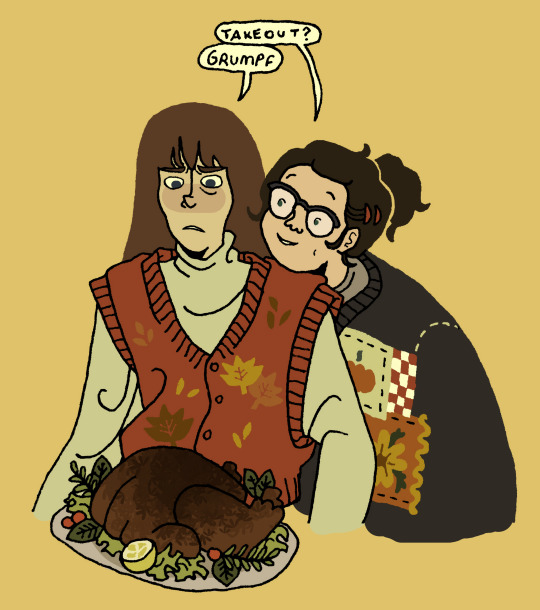
Theyre spending thanksgiving together
#Erin is a grumpy baby#And Abby is a cute little supportive one#And neither of them can cook#Thanksgiving#Yatesbert#Ghostbusters ATC#Ghostbusters 2016
14 notes
·
View notes
Text
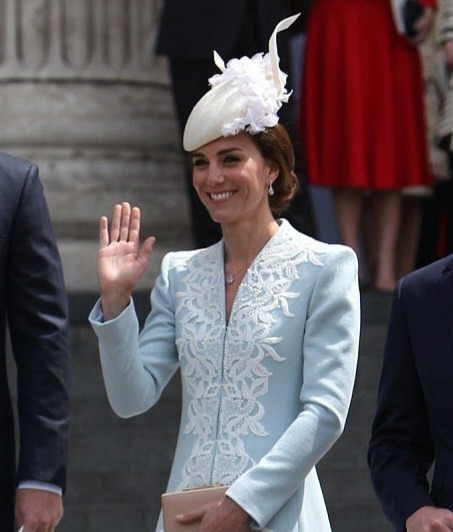

CATHERlINE'S STYLE FILES - 2016
10 JUNE 2016 || The Duchess of Cambridge attended a National Service of Thanksgiving as part of the 90th birthday celebrations for The Queen at St Paul's Cathedral in London along with the Duke of Cambridge and other members of the Royal Family.
#catherines style files#style files 2016#duchess of cambridge#catherine cambridge#mine.#10.06.2016#queen's 90 the birthday service of thanksgiving#british royal family#british royals#brf#kate middleton#catherine middleton#royalty#royals#royal#royal fashion#fashion#style#lookbook#catherine walker.#lk bennet.#gianvito 105.#gianvito rossi.#jane taylor.#aquamarine and diamond pear drop earrings#aquamarine cushion pendant necklace
15 notes
·
View notes
Text
Carbon dating a really old tumblr post that someone randomly liked is fun
#somewhere when i was still living with my dad and hated my stepmom#and when undertale was still popular. maybe new?#also i used to organize my posts i kinda miss that#oh wow i found when we got the guinea pig my stepmom used to care for#and my stepmom being a bitch baby bc i told her not to put a solid lid with a few holes drilled into it on#the aquarium she lived in at the time#and complaining to my dad bc he was taking my side and i make her feel stupid lmak#i always want to go back and delete all the posts i made complaining about her then i read them and feel justified again#✌️#also found when i broke my laptops hinge like a yr after i got it so that means the post was made in 2016#sometime in November maybe even dec#bc we got the gp at Thanksgiving that yr and i was still into undertale which came out in September#oh no i was wrong it was 2015#i forgot i got the laptop when i was in school for Christmas#so it was the year i graduated#djsbsnsnsnsn#pretty good carbon dating 😎
2 notes
·
View notes
Text

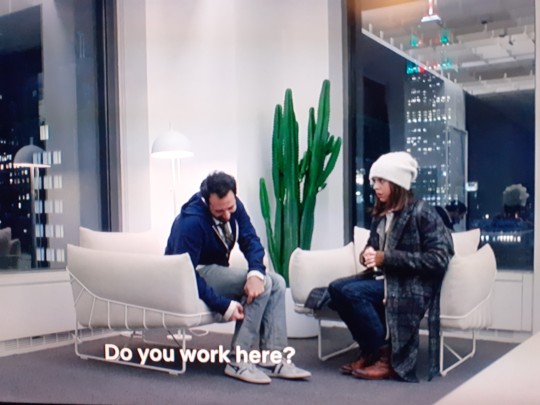
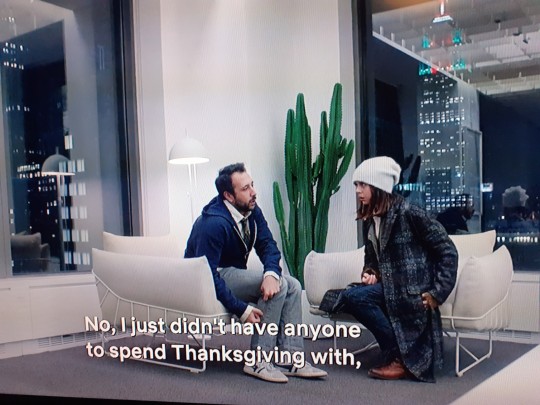
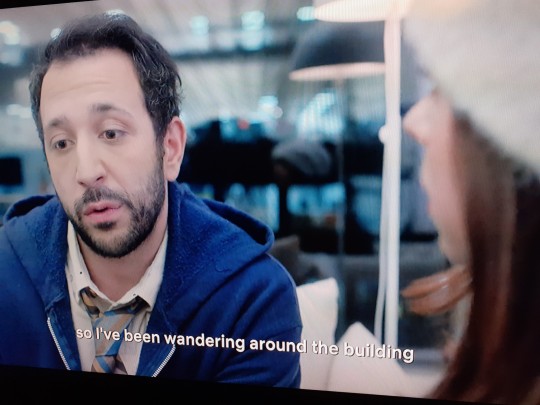
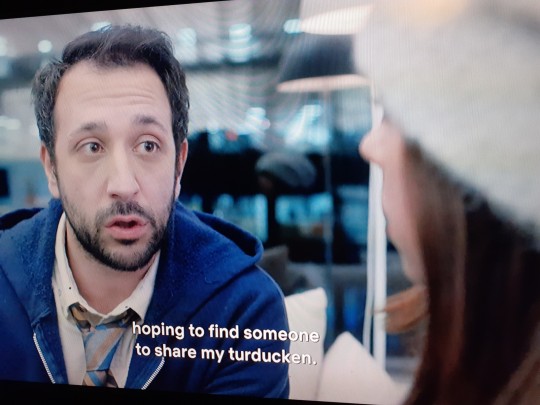



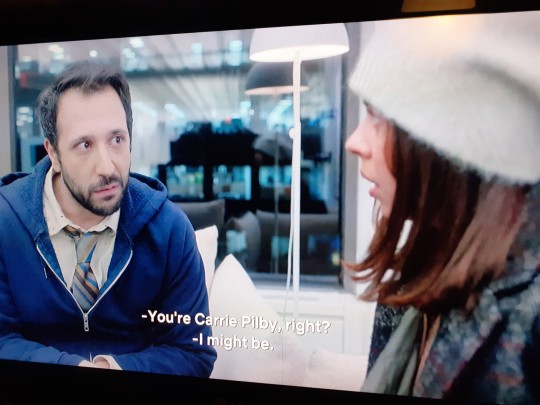
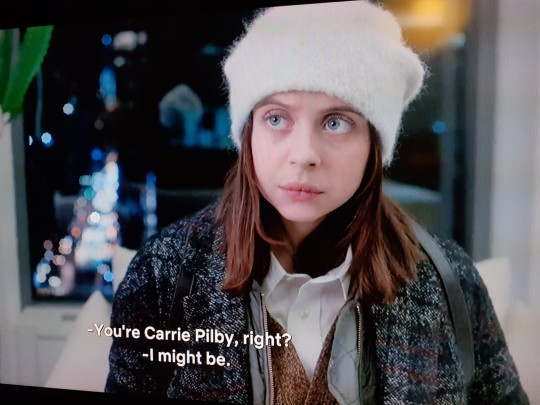
Carrie Pilby (2016)+ holidays: Thanksgiving 3/ 3
#carrie pilby 2016#carrie pilby#bel powley#susan johnson#nocticola art#female directors#thanksgiving
0 notes
Text
happy falsettos side by side day
19 notes
·
View notes
Text
I've been alone for most holidays since 2017 due to work, money, and distance situations. The only options are usually going to a stranger's or a coworkers house, which to me is worse than being alone. And this all used to make me feel a little lonely but now it doesn't, and honestly it's a little confusing.
I ask myself, do I not feel lonely out of necessity, because I've lived a comparatively isolated life? Do I not feel lonely because I'm autistic and find a lot of comfort in being alone? If we're such a social species, why do I find comfort in being alone? Is it capitalism? Is it me?
Every time, I feel like the loneliness never comes from within me though, but only when people make a big deal over the fact I'll be alone. Perhaps I don't feel lonely anymore because I've stopped caring about the social perception of it. Or maybe it's just shoved really deep. Who knows.
#Not that i don't want to be with friends and family but I've come to accept we're usually on other sides of the country/world#And so i don't really mourn the fact that I'm alone because I started to accept it in 2016#personal#anyways I'm going to watch Ratatouille in Spanish for thanksgiving and make some mango salsa and brownies#you can reblog this i don't mind
1 note
·
View note
Text
“With all this commotion I forgot we need to say grace!”
“You’re right honey, I’ll do it. Oh dearest God above looking down on us, please blow my fuckin head off.”
1 note
·
View note
Text
I get variations on this comment on my post about history misinformation all the time: "why does it matter?" Why does it matter that people believe falsehoods about history? Why does it matter if people spread history misinformation? Why does it matter if people on tumblr believe that those bronze dodecahedra were used for knitting, or that Persephone had a daughter named Mespyrian? It's not the kind of misinformation that actually hurts people, like anti-vaxx propaganda or climate change denial. It doesn't hurt anyone to believe something false about the past.
Which, one, thanks for letting me know on my post that you think my job doesn't matter and what I do is pointless, if it doesn't really matter if we know the truth or make up lies about history because lies don't hurt anyone. But two, there are lots of reasons that it matters.
It encourages us to distrust historians when they talk about other aspects of history. You might think it's harmless to believe that Pharaoh Hatshepsut was trans. It's less harmless when you're espousing that the Holocaust wasn't really about Jews because the Nazis "came for trans people first." You might think it's harmless to believe that the French royalty of Versailles pooped and urinated on the floor of the palace all the time, because they were asshole rich people anyway, who cares, we hate the rich here; it's rather less harmless when you decide that the USSR was the communist ideal and Good, Actually, and that reports of its genocidal oppression are actually lies.
It encourages anti-intellectualism in other areas of scholarship. Deciding based on your own gut that the experts don't know what they're talking about and are either too stupid to realize the truth, or maliciously hiding the truth, is how you get to anti-vaxxers and climate change denial. It is also how you come to discount housing-first solutions for homelessness or the idea that long-term sustained weight loss is both biologically unlikely and health-wise unnecessary for the majority of fat people - because they conflict with what you feel should be true. Believing what you want to be true about history, because you want to believe it, and discounting fact-based corrections because you don't want them to be true, can then bleed over into how you approach other sociological and scientific topics.
How we think about history informs how we think about the present. A lot of people want certain things to be true - this famous person from history was gay or trans, this sexist story was actually feminist in its origin - because we want proof that gay people, trans people, and women deserve to be respected, and this gives evidence to prove we once were and deserve to be. But let me tell you a different story: on Thanksgiving of 2016, I was at a family friend's house and listening to their drunk conservative relative rant, and he told me, confidently, that the Roman Empire fell because they instituted universal healthcare, which was proof that Obama was destroying America. Of course that's nonsense. But projecting what we think is true about the world back onto history, and then using that as recursive proof that that is how the world is... is shoddy scholarship, and gets used for topics you don't agree with just as much as the ones you do. We should not be encouraging this, because our politics should be informed by the truth and material reality, not how we wish the past proved us right.
It frequently reinforces "Good vs. Bad" dichotomies that are at best unhelpful and at worst victim-blaming. A very common thread of historical misinformation on tumblr is about the innocence or benevolence of oppressed groups, slandered by oppressors who were far worse. This very frequently has truth to it - but makes the lies hard to separate out. It often simplifies the narrative, and implies that the reason that colonialism and oppression were bad was because the victims were Good and didn't deserve it... not because colonialism and oppression are bad. You see this sometimes with radical feminist mother goddess Neolithic feminist utopia stuff, but you also see it a lot regarding Native American and African history. I have seen people earnestly argue that Aztecs did not practice human sacrifice, that that was a lie made up by the Spanish to slander them. That is not true. Human sacrifice was part of Aztec, Maya, and many Central American war/religious practices. They are significantly more complex than often presented, and came from a captive-based system of warfare that significantly reduced the number of people who got killed in war compared to European styles of war that primarily killed people on the battlefield rather than taking them captive for sacrifice... but the human sacrifice was real and did happen. This can often come off with the implications of a 'noble savage' or an 'innocent victim' that implies that the bad things the Spanish conquistadors did were bad because the victims were innocent or good. This is a very easy trap to fall into; if the victims were good, they didn't deserve it. Right? This logic is dangerous when you are presented with a person or group who did something bad... you're caught in a bind. Did they deserve their injustice or oppression because they did something bad? This kind of logic drives a lot of transphobia, homophobia, racism, and defenses of Kyle Rittenhouse today. The answer to a colonialist logic of "The Aztecs deserved to be conquered because they did human sacrifice and that's bad" is not "The Aztecs didn't do human sacrifice actually, that's just Spanish propaganda" (which is a lie) it should be "We Americans do human sacrifice all the god damn time with our forever wars in the Middle East, we just don't call it that. We use bullets and bombs rather than obsidian knives but we kill way, way more people in the name of our country. What does that make us? Maybe genocide is not okay regardless of if you think the people are weird and scary." It becomes hard to square your ethics of the Innocent Victim and Lying Perpetrator when you see real, complicated, individual-level and group-level interactions, where no group is made up of members who are all completely pure and good, and they don't deserve to be oppressed anyway.
It makes you an unwitting tool of the oppressor. The favorite, favorite allegation transphobes level at trans people, and conservatives at queer people, is that we're lying to push the Gay Agenda. We're liars or deluded fools. If you say something about queer or trans history that's easy to debunk as false, you have permanently hurt your credibility - and the cause of queer history. It makes you easy to write off as a liar or a deluded fool who needs misinformation to make your case. If you say Louisa May Alcott was trans, that's easy to counter with "there is literally no evidence of that, and lots of evidence that she was fine being a woman," and instantly tanks your credibility going forward, so when you then say James Barry was trans and push back against a novel or biopic that treats James Barry as a woman, you get "you don't know what you're talking about, didn't you say Louisa May Alcott was trans too?" TERFs love to call trans people liars - do not hand them ammunition, not even a single bullet. Make sure you can back up what you say with facts and evidence. This is true of homophobes, of racists, of sexists. Be confident of your facts, and have facts to give to the hopeful and questioning learners who you are relating this story to, or the bigots who you are telling off, because misinformation can only hurt you and your cause.
It makes the queer, female, POC, or other marginalized listeners hurt, sad, and betrayed when something they thought was a reflection of their own experiences turns out not to be real. This is a good response to a performance art piece purporting to tell a real story of gay WWI soldiers, until the author revealed it as fiction. Why would you want to set yourself up for disappointment like that? Why would you want to risk inflicting that disappointment and betrayal on anyone else?
It makes it harder to learn the actual truth.
Historical misinformation has consequences, and those consequences are best avoided - by checking your facts, citing your sources, and taking the time and effort to make sure you are actually telling the truth.
14K notes
·
View notes